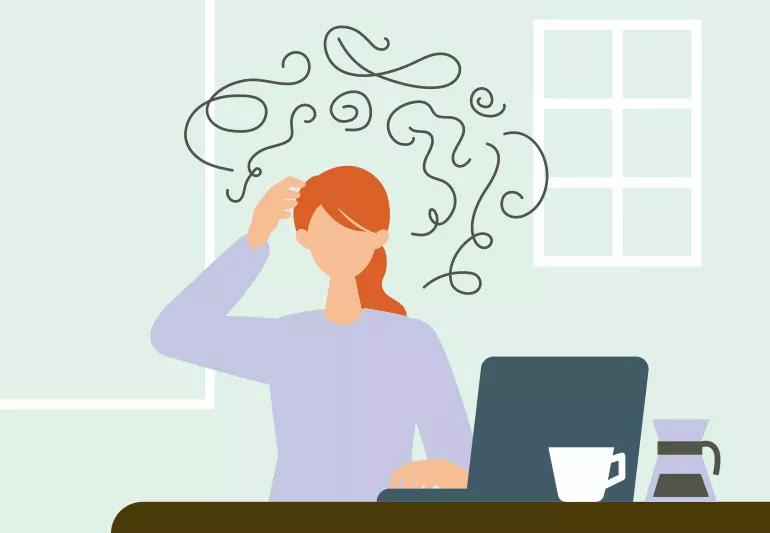Advertisement
Here’s how to keep excessive worrying in check

We all have times when we worry, whether it’s about work, health, family, relationships or a host of other reasons.
Advertisement
Cleveland Clinic is a non-profit academic medical center. Advertising on our site helps support our mission. We do not endorse non-Cleveland Clinic products or services. Policy
But is there a point when you can think and worry too much?
Overthinking is an unhealthy habit that typically causes more stress by focusing on the negative, dwelling on the past and worrying about the future.
Instead of problem-solving, you ruminate on an issue without coming up with logical solutions. It’s almost like a broken record of negativity that replays repeatedly in your head.
So, how you can stop overthinking?
Registered psychotherapist Natacha Duke, MA, RP, outlines strategies that can help.
Overthinking is a habit that can be hard to break.
It’s a vicious cycle of negative thoughts that builds and builds, or feels like you’re spinning down a rabbit hole. For example, you may start worrying about a specific situation at work, which leads to worrying about money, which leads to worrying about losing your job.
But why do you tend to overthink?
Overthinking can be a symptom of stress, anxiety or depression.
While overthinking isn’t a mental disorder in and of itself, it can be connected to generalized anxiety disorder (GAD). Those with GAD tend to worry excessively about many things and may experience the following:
Additionally, you may feel restless or agitation (as if you’re “revving”), have difficulty concentrating and experience impairments with sleep.
When we overthink, we usually become more anxious. This is often due to cognitive errors, which are basically errors in logical thinking, says Duke. Here are some examples of common cognitive errors.
This is when you imagine a worst-case scenario as the inevitable outcome of a situation you’re worried about.
“When we are caught up in overthinking, we typically go straight to the worst-case scenario and also overestimate the likelihood of that scenario actually happening,” says Duke.
You may feel like you’re struggling at work, or on the flip side, like you’re the employee of the month. It’s all-or-nothing thinking — there’s no gray area.
“Whereas in reality, most things in life are somewhere in between,” notes Duke.
A type of therapy called cognitive behavioral therapy (CBT) is effective for overcoming overthinking and recognizing cognitive errors.
“It helps one learn to first identify the errors, then to reframe the thinking in more logical and balanced ways,” says Duke.
This is when we experience a setback or failure and generalize that event across all situations. We may wrongly assume that things have — and will always — go wrong for us.
Advertisement
While anxiety tends to be more future-oriented, you may also struggle with overthinking about the past.
“Doing so is more connected with depression,” says Duke.
But you could be dealing with depression and anxiety at the same time. Experiencing two mental health conditions at the same time is called comorbidity.
“Working with a CBT-trained therapist can help alleviate both anxious and depressed moods,” says Duke.
Duke shares some tips and strategies on how to stop overthinking.
Duke suggests CBT.
“CBT helps you learn how to identify then challenge and reframe your negative thoughts and also teaches how to cope with your worry and anxiety in healthier ways,” she explains.
Choose a time in the day to implement a worry period — aiming for about 30 minutes.
“During that time, you write down all your worries,” advises Duke. “Then, go through your list and highlight the worries that you can problem-solve, things you have control over.”
Then, spend some time brainstorming solutions. For the items you have no control over (like how someone else may react to a situation), work on letting them go until your next worry period.
“You’re really trying to only worry during your worry period. It takes a little bit of time,” says Duke. “But eventually what happens is you develop better control over your worrying.”
Advertisement
Do you constantly ponder questions like “What if I lose my job?” or “What if I get sick?”
While having these thoughts is normal, it becomes a problem when you focus only on the worst-case scenario.
“For every ‘what if’ worry, change this to an ‘if then’ statement where you come up with a ‘then I will do/say’ if that ‘what if’ or even worst-case scenario does happen,” says Duke. “Focus on having a concrete plan in place.”
You may think your boss hates you or you’ll never reach your fitness goals.
Instead of letting those negative thoughts take over, challenge and reframe them into positive, empowering thoughts.
“Ask yourself if that thought is helpful,” suggests Duke. “What is the evidence that my negative thought is true? Is there an alternative possibility? The goal is to try and have a more balanced perspective.”
“Healthy distraction can be helpful,” says Duke.
Activities like meditation, reading and taking a walk can help keep your stress levels down.
“It’s best to be proactive and build these activities into your routine,” says Duke. “They can reduce your baseline level of anxiety and make you less likely to overthink.”
But if you’re already too stressed and struggling to find relief from healthy distraction, it can then be helpful to share your thoughts and feelings with someone you trust.
“Resist the urge to keep things inside that are bothering you,” says Duke. “Try talking to a friend, family member or therapist.”
Advertisement
You probably know how to show compassion to your mother or a friend. But what about yourself? What does your inner dialogue sound like when you face a problem or challenge?
“It’s really about being able to extend love, kindness and forgiveness to yourself,” says Duke. “In doing that, you’re actually going to soothe your body’s internal threat system and you will have a clearer mind with which to problem-solve your situation.”
While everyone overthinks sometimes, if you’ve been unable to control how much you worry and it starts interfering with your ability to function, it may be time to seek help from a professional.
You may also start experiencing physical symptoms like irritability, fatigue, concentration or memory difficulties and insomnia. Excessive worrying and stress can also lead to or intensify digestive issues, plus cause tension in your shoulders and neck.
“If you find that it’s difficult to control your worrying or it’s hard to concentrate at work or it’s hard to fall asleep at night, at that point, I would definitely seek professional help,” advises Duke.
One thing you will learn in therapy is how to not get caught up in your worrying, says Duke.
“When you’re in the midst of worrying, you don’t always recognize it,” she says. “With CBT, you will learn how to recognize that you’re spiraling and engaging in unhelpful rumination. You will practice writing down your negative thoughts, then challenging and reframing them. Essentially, you will develop an effective toolkit for coping with overthinking.”
Advertisement
Learn more about our editorial process.
Advertisement

Our collective misremembering of events comes from a surplus of false memories

This alternative brain-body therapy focuses on unlocking pent-up feelings, memories and tension that may be stuck in your brain and body

While walking, be mindful of your body, your mind, your place in the world and all five of your senses as you pave a path forward, one step at a time

Local LGBT centers, online directories, visual cues and gender-affirming care or non-discrimination policies can all be helpful resources and cues

In a world where instant gratification is the norm, you can train yourself to be more comfortable waiting patiently

Look to activities you enjoy — or try a new hobby — to help foster meeting new people

This romantic orientation involves little to no romantic attraction to others and exists on a spectrum

American teens are facing unprecedented rates of depression and suicide, but you can be there to support and help them

Focus on your body’s metabolic set point by eating healthy foods, making exercise a part of your routine and reducing stress

PFAS chemicals may make life easier — but they aren’t always so easy on the human body

While there’s little risk in trying this hair care treatment, there isn’t much science to back up the claims